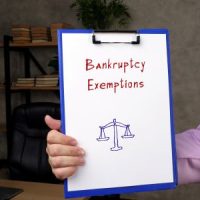How Unwritten Bankruptcy Exemptions Help You

Illinois’ formal, written bankruptcies, which include a large wildcard exemption that could apply to almost any property, are some of the most generous exemptions in the country. Typically, these exemptions are more than enough to protect houses, cars, and other key property, so debtors get the fresh start the Bankruptcy Code guarantees.
But almost every rule has exceptions. If your bankruptcy falls into one of these exceptions, a Chicago bankruptcy lawyer may be the only thing that prevents the trustee (person who oversees a bankruptcy for a judge) from forcibly liquidating that asset and distributing the money to creditors. This critical legal knowledge is one of the best reasons to partner with an attorney when you file Chapter 7 or Chapter 13 bankruptcy.
As-Is Cash Value
Assets like houses and cars usually have three values: declared value, fair market value, and as-is cash value. A Chicago bankruptcy lawyer uses the third kind of value, not only because it’s usually lower, but also because it’s the value the Bankruptcy Code requires.
For example, Ben’s house’s declared value might be $200,000, per the tax appraiser website. The tax appraiser value is inflated, because the higher the value, the more taxes the city or county collects.
The fair market value of that home could be significantly higher, if it’s a seller’s market, or significantly lower, if it’s a buyer’s market. Other factors, such as the prevailing mortgage interest rate, affect the FMV price as well.
The as-is cash value is only a fraction of the declared or fair market value. Most no-inspection cash home investors initially offer about ten cents on the dollar, or even less.
If the home’s as-is cash value is $20,000, the trustee would most likely not be able to reimburse Ben for his home equity without running over the $40k limit.
Best Interests of Creditors
Trustees may only seize and liquidate property if that seizure and liquidation is in the best interests of the creditors (i.e. they make a substantial amount of money on the deal).
Assume Ben has ten primary creditors, mostly credit card companies and debt buyers. He also has a nonexempt boat that’s worth $3,000. But the boat needs substantial repairs, which the trustee must pay for. Additionally, the trustee must pay all sales costs, such as seizing the boat, storing the boat, and listing it at auction. Finally, the auction sales price will most likely be at or below the asking price.
All these extra costs and uncertainties add up to $2,500. So, each of the ten creditors would receive $50. A Chicago bankruptcy lawyer could successfully argue that the seizure and liquidation would be a waste of time and therefore prohibited under the Bankruptcy Code.
High-Value Vehicle Redemption
This bankruptcy loophole isn’t technically an unwritten exemption, but it’s close, so we’ll include it in this discussion.
Assume Ben owes $10,000 on a used car with a FMV of $5,000. If Ben pays the FMV price to the bank before the bankruptcy ends, he can exercise the redemption option, and the bank must tear up the remainder of the loan.
Note that regular monthly car payments mostly go to prepaid interest, not UPB (unpaid principal balance). Therefore, Ben must probably make substantial additional payments to redeem the car.
Contact a Hard-Working Cook County Lawyer
No matter what kind of financial problem you are having, bankruptcy could be a way out. For a confidential consultation with an experienced tax lawyer in Chicago, contact the Bentz Holguin Law Firm, LLC. Convenient payment plans are available.


